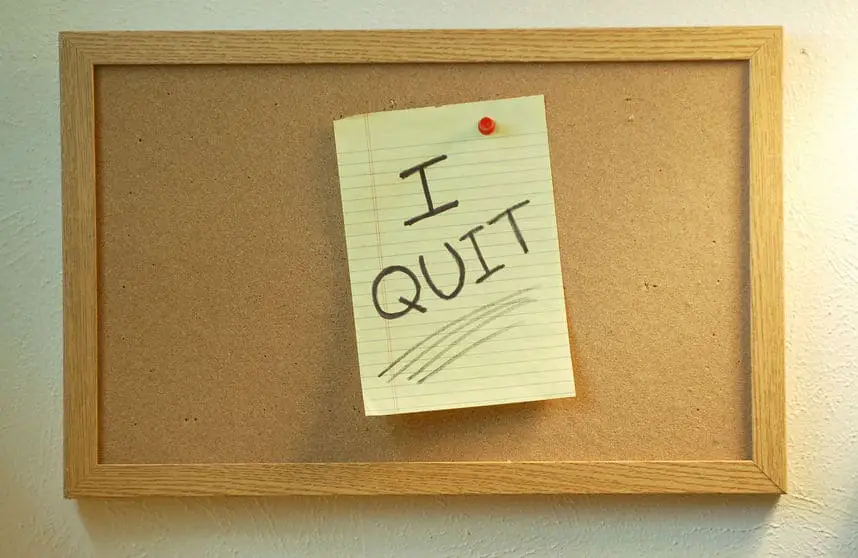It’s becoming increasingly more common for employees to seek indirect methods of communicating their intent to resign. According to a report, about 24% of Americans would prefer to quit a job over email, phone, or text message. While a face-to-face conversation may be uncomfortable, are there compelling reasons to quit the old-fashioned way?
Why should you quit your job in-person? The simplest answer is that it’s more respectful. People quit their jobs for all kinds of reasons, and there can be a great deal of emotion involved in these transitions. But, having a direct conversation is the best way to ensure that you leave the company on a good note.
When you’re moving on to a new opportunity, it may seem easier to peace out without so much as looking anyone in the eye. However, don’t reach for your phone just yet. We’ve got nine reasons that you should head into the office to tender that resignation. But first, let’s talk about some of the reasons why people decide to avoid quitting in-person.
Why Do People Avoid Quitting In-Person?

With quitting via text, phone, and email on the rise, it bears asking, “what are the driving forces behind avoiding face-to-face communication when quitting?” There are a number of factors that may affect a decision to quit over the phone. Let’s break them down.
1. Fear of Conflict
Many people don’t like getting into conversations or situations that can easily turn aggressive or contentious. It’s important to remember that employment is ultimately a financial transaction. There’s no need for a termination of employment to be viewed as a personal rejection.
Of course, you can’t control how your manager or supervisor will react to the news. You should aim to be the bigger person, and no matter how badly the conversation goes, you’ll be out of there soon anyway. Odds are that if you act professionally, so will whoever you’re bearing the news to.
2. Fear of Causing Disappointing
If you’re a good employee with a strong relationship with your employer, your employer may be justifiably dismayed to learn of your upcoming departure. You should see this disappointment as a compliment of your good work. Your boss will probably miss having a skilled and dedicated worker, but they’re also likely to wish you well and be proud of your accomplishments.
3. Apathy
Some people simply can’t be bothered to care. They don’t care how they come off or how their actions will affect others or themselves. They simply take the path of least resistance. It’s important to invest in yourself and in your career. Take the time and effort to make a lasting positive impression, and it may pay dividends down the line.
4. Laziness
Sometimes going in to talk to someone just feels hard. Wouldn’t it be so much easier to just send a text or make a phone call and be done with it? You go into work every day and talk to your boss anyway. This isn’t more than you can handle. Pick yourself up, put your phone in your pocket and go tell your boss in person that you’ll be leaving the company.
5. I’ll Never See Them Again
When you’re about to quit, It can be easy to feel like you’re never going to see anyone you work with again and so their opinion of you doesn’t really matter. This may not be as true as you’d like it to be. It’s entirely possible that you’ll run into a former boss or coworker in a public place or need a reference for a future job. That interaction will be a lot more pleasant if you left on a positive and professional note.
6. Shyness
Some people are just shy. They get anxious in social situations and constantly worry about how they come off to others. Many people that struggle with shyness or social anxiety prefer to hide behind texts and phone calls where they can eliminate some of the discomforts they feel. That discomfort is only amplified in something like quitting, which may pull them out of their comfort zone.
The only solution to overcoming shyness is to simply buck up and get it done. The conversation will be pretty brief, and you can breathe a sigh of relief once it’s over. Odds are it won’t be as bad as you’ve built it up to be.
7. Control
Another reason people may want to stick to texting or calling is that it’s easier for them to prepare or draft what they’re going to say. This gives a sense of control over the situation. You may feel that if you can craft just the right words, then the whole thing will go off much smoother.
The reality is that by not approaching someone head-on with news that you’re quitting, you’re already starting off behind. The very fact that you haven’t approached them directly is likely to undo any good your perfectly phrased resignation might have done. Just go in, let them know that you’re leaving and it goes how it goes. Don’t sweat it.
Why You Shouldn’t Quit Over Text or Phone
Once you’ve identified what’s driving the urge to avoid a face-to-face conversation about terminating your employment, it can be easier to overcome. But, perhaps you’re still unconvinced that you should even bother going through the effort. Here are nine reasons to put your phone away and head into the office when you’re quitting your job.
1. You Might Burn Bridges
When you’re quitting, it can be easy to be focused on the future and to place your current job and the people there, firmly in the rearview mirror. You should absolutely be excited about your new position and there’s nothing wrong with looking to the future. However, announcing your departure in person is customary and anything else could reflect poorly on you.
Career paths can take complicated and unexpected turns. You never know if you may wind up wanting a return to employment at your current company or try to get hired by your current boss or one of your coworkers. If nothing else, you may want to maintain good relationships so that you list your employer as a reference on future applications.
Especially if you’re staying in the same industry, quitting over the phone can send a message which may come back to haunt you. Something as simple as quitting by text could limit your options in the future. It’s probably best to professionally deliver your resignation and keep your options open.
2. You Need to Clear Out Your Office

You’ve got things at work. Whether you’ve got an office, a desk, or a locker, there’s nothing more uncomfortable than slinking back into work with your head hung low to grab the things you left behind.
You could just clean out your stuff before actually resigning, but if your boss saw you, it could lead to the same conversation that you’re trying to avoid. The only difference would be that you wouldn’t be prepared, and it’s a far more awkward circumstance.
In addition to clearing out your things, you may have things belonging to the company that you need to return. Employee ID badges, work phones, or company laptops all will need to be returned, or you can expect wage reduction on your final paycheck or even possible legal retaliation.
Head into the office, quit your job, and then you can clear out with your head held high.
3. Your Boss Could Miss the Message
If you leave a voicemail, text message, or email, announcing that you won’t be returning to work, there’s always the outside chance that your boss will miss the message. It would be pretty uncomfortable to get a call from your boss, asking why you haven’t shown up to work.
Having a conversation ensures that the message has been received and that your employment has been fully and officially terminated. Again, your effort to avoid having a real conversation could wind up in you having the same conversation under less than ideal circumstances.
4. It’s Just a 5-Minute Conversation
Obviously, if you’re quitting your job, odds are that you’re less than thrilled with your current work situation. When you finally get the chance to break free of a work environment, it can feel quite freeing, and you may want to begin your emancipation effective immediately.
You’ve been putting up with whatever has been going on for weeks, months, or maybe even years. You can face it a little longer. While telling your boss that your moving on to greener pastures may not be the most pleasant conversation, it’s unlikely to take longer than five minutes.
Just put up with a brief face-to-face conversation, you’ll soon be on to bigger and better things. Five minutes of potential discomfort is certainly worth exiting with dignity and professionalism.
5. Don’t Miss the Chance to Say Thanks and Goodbye
Your boss may not be your favorite person in the world. However, it’s unlikely that you hate everyone at work. It’s also unlikely that there hasn’t been some valuable lesson or opportunity that’s come from your current employment. Most people spend more waking hours with their coworkers than their own families.
If you quit in-person at work, you have the chance to thank your employer for hiring you and helping you move towards this new, exciting chapter in your career. Afterwards, you can take a moment to say goodbye to your friends and coworkers.
6. You Don’t Want to Appear Disrespectful
The impression you make on people matters, even after you’ve left. Consider that it won’t just be your boss who notices your unprofessional departure, but also your coworkers, colleagues, and upper management.
It’s easy to think that you’re leaving the job behind, and you’ll never see any of these people again, but as we mentioned before, it can be hard to predict where your career will take you. If you’re staying in the same industry, in the same location, it’s actually fairly likely that your path will cross with someone you currently work with again. You don’t want that future meeting to be tainted by a departure that felt like a slap in the face.
Represent yourself in the most professional and dignified way possible, even as you exit. The way you act when there appear to be no consequences for your actions is the clearest indicator of your character, and people will take notice. Make sure they notice something positive and impressive.
7. Maintain a Strong Network

Networking is becoming a more and more vital part of job hunting. By going in-person to work and delivering your resignation, you’ll get one last chance to cement the relationships you’ve formed in your current role.
We’ve said it before, but you just never know where life will take you and those around you. One of the people you work with could wind up working for a company you’re applying for. The guy in the cubicle over could become a hiring manager, a recruiter, or an entrepreneur.
Use your goodbyes as a final chance to network. Make sure to get your bosses and coworkers contact information, add them on LinkedIn or other social networking sites. This way, you’ll leave having left a positive last impression and prepared to leverage your connections should an opportunity arise.
8. You Should Give Two Weeks’ Notice
It’s customary to give your employer two weeks’ notice before your last day that you’re quitting. This gives the employer some time to start searching for a replacement and to make plans to divide up your workload in the interim. Giving a full two weeks’ notice is a good idea for many of the same reasons that we’ve already talked about. It’s more professional and will leave a better parting impression on your boss and coworkers.
If you’re quitting over text, odds are that you aren’t going into work the next day. What would be the point? Otherwise, you will still have to look your boss in the eye and have a conversation about your termination. The safest and most professional route is to give notice of your intent to quit two weeks before your last day.
9. It’ll be More Satisfying to Quit In-Person
Quitting by call or by text might feel easier and less confrontational, but imagine how good you’ll feel walking out of the building for the last time, fully separated and ready for your new position. The sense of catharsis is worth every ounce of potential discomfort.
It doesn’t matter what your relationship with your employer or coworkers is; you’re still almost guaranteed to feel more satisfied if you quit while looking your boss in the eye. If you’ve got a good relationship with your boss, then you’re afforded a final opportunity to say “thank you” and receive some last words of mentoring. If you’ve got a less desirable relationship, then you get the opportunity to smugly declare that you’re moving on to greener pastures.
Don’t go overboard. Remember to maintain a sense of professionalism. All our earlier advice still applies. But if things have been bad at work, it can feel pretty good to walk in and announce that you’ll be leaving the company. This is a chance for you to flip the power dynamic and put yourself in a position of strength.
Whether sad or smug, quitting in person is the best way to put a capstone on the end of your employment. You can walk away, feeling fully prepared for the future of your career and everything that comes with it.
When Might it Be Acceptable to Quit Over the Phone?
In spite of all our warnings, are there any situations where quitting over the phone, text, or email is acceptable or unavoidable? The answer is, yes. Here are a couple of scenarios where it might make sense to quit by phone.
1. Your Boss is Far Away
If you work for a company remotely, or for a supervisor who lives in a different state, it might not make sense to quit in person. If this is your situation, you’ll want to deliver the news through the most professional and personal means of communication which is available to you. You certainly don’t need to buy a plane ticket just to tender your resignation.
It’s also possible that things will line up so that you’re leaving your job while your direct supervisor is on vacation or out of town. Depending on the structure of your company, there may be someone else you can talk to or you may simply need to pick up the phone. Sometimes these things can’t be helped.
2. Phone/Email/Text is the Primary Way You Communicate with Your Boss
Again, if you work remotely or in a role with a great deal of autonomy, it may not be typical for you to see your supervisor or even to speak to them directly on the phone.
If this is the situation you find yourself in, simply communicate your resignation professionally through the means of communication you normally use for important news. In some positions, this may be the phone, email, or even text messaging or instant messaging. The key is simply to be as professional as possible with the tools available to you.
